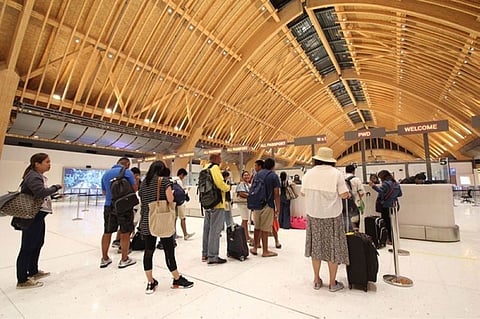

At ease at home. The expression one traditionally associates with travelers anticipating their return rarely expresses the genuine sentiments of many of the half a million Filipinos repatriated since the coronavirus disease (Covid-19) pandemic began nearly two years ago.
Seeking to change this view, the Department of Labor and Employment (Dole)’s attached agency, the Overseas Workers Welfare and Administration Central Visayas (Owwa) 7 signed agreements with five cities and towns in Cebu to operate help desks for overseas Filipino workers (OFWs).
Last Nov. 13, Cherry Ann T. Lim reported in SunStar Cebu that local government officials of Daanbantayan, Carcar, Minglanilla, Consolacion, and Cordova signed the memorandum of agreement with the Owwa 7.
The help desks will facilitate the delivery of Owwa programs and services, crucial for changing the mindset that overseas work at any cost is the key to Filipino survival.
Media reports cases of outbound OFWs caught presenting fake reverse transcription-polymerase chain reaction (RT-PCR) test results and consequently charged with the falsification of a public document, a violation under the Revised Penal Code.
Why do Filipino workers opt to violate the law rather than avail of the Owwa services, which include livelihood grants and scholarship programs?
On Aug. 25, 2021, the Philippine News Agency (PNA) reported that outbound OFWs were caught presenting fake RT-PCR tests in Baguio. Unable to return to Metro Manila, then under restrictive community lockdown, the workers sought to process their National Certification, a prerequisite for overseas work, at the Baguio office of the Technical Education and Skills Development Authority.
The Baguio City Police Office (BCPO) said that the arrested OFWs were bailed out by their manpower agency “as their foreign employment visas are already expiring and they already have schedules to fly for foreign employment,” reported the PNA.
The BCPO reported that six workers from Cavite were caught committing the same violation; their manpower agency also bailed them out.
Bail for each worker presenting a fake RT-PCR test is P34,000. While a manpower agency will initially pay the bail amount, this may be added to the considerable deductions taken from the earnings of the OFWs.
The resistance of many returning OFWs to staying in the country speaks volumes of the country’s success in facilitating the OFWs’ reintegration into Filipino society. The number of syndicates and unscrupulous individuals taking advantage of Filipinos still clinging to the dream of overseas work as the ticket out of poverty, proves the desperation of many Filipino families not just despite, but especially because of the Covid-19 pandemic.
Through data and document analysis, researcher Karen Anne S. Liao concludes that the Philippine government has an “uneven approach” in sending and repatriating its workers. In her paper “Operation ‘Bring Them Home’: learning from the large-scale repatriation of overseas Filipino workers in time of crisis,” published in Volume 16, No. 3 of “Asian Population Studies,” Liao comments that while the sending state has “built a comprehensive system of labour export,” the plight of repatriated OFWs reveals the reasons why Filipinos are desperate to leave as soon as they can, even if it means violating the law: a “less coordinated repatriation system and a less fortified reintegration policy.”
The Owwa help desks set up in the five cities and towns in Cebu should close the gaps created by ignorance, anxiety, and desperation that make OFWs and their families among the most vulnerable sectors exploited in crises.
Yet more public and private stakeholders should uphold Filipinos’ commitment to honor our debts to the OFWs, our modern-day heroes who shored up the economy through their remittances, to enable them and their families to remain in the country without sacrificing financial security, well-being, and sanity.